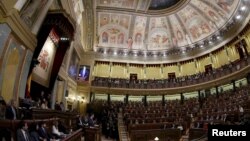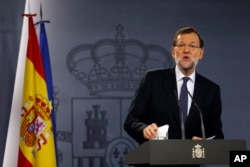The leader of Spain's Socialists failed on Friday to win the confidence of parliament to become prime minister, opening a new round of talks between parties who now have just two months to break a 10-week deadlock and avoid a fresh election.
In a first for Spain, Pedro Sanchez lost his second investiture vote, securing the support of only 131 members of the 350-strong assembly for his proposed coalition which sets the country on course for its second election in six months.
Spain's parties have been in fruitless negotiations to form a government since a December vote when Spaniards weary of austerity and corruption deserted the two traditional parties to vote for newcomers.
But the talks, which have often boiled over into vitriolic attacks that have highlighted tensions between Spain's political left and right, are now set to continue at a time when the Spanish economy is staging an uneven recovery.
As on Wednesday when Sanchez lost a first vote, acting Prime Minister Mariano Rajoy's conservative People's Party (PP), anti-austerity upstart Podemos and five smaller parties voted against Sanchez, scuppering his pact with business-friendly Ciudadanos. A small party from the Canary Islands also voted for Sanchez.
Until the last minute the Socialist leader tried to woo Podemos into joining his "government of change" but the party's leader Pablo Iglesias, a pony-tailed former university lecturer, held out for an alliance solely between leftist parties.
"I will continue working to achieve the majority this country needs," Sanchez told reporters after the vote. "Pablo Iglesias has betrayed his party's voters and he is responsible for Rajoy remaining as prime minister."
Iglesias before the vote compared his dispute with the Socialists to a quarrel between lovers and said Sanchez should embrace the other "monstrous" leftist parties which would be needed to reach the parliamentary majority of 176 seats.
A coalition between the Socialists and Podemos would have to depend on former communists Izquierda Unida and four regional parties from the Basque Country and Catalonia, all of which voted against Sanchez on Friday.
"I again offer you my hand Mr. Sanchez, and after tonight we will be able to get to work," Iglesias, who came third in the December general election, told a restless parliament where speakers were repeatedly interrupted by jeers and whistles.
Closer to New Elections
Sanchez's failure, the first time a candidate had lost both confidence votes since Spain returned to democracy in the mid-1970s, sets the clock ticking on a two-month window for parties to form an alternative majority before May 2.
On that date parliament would be dissolved and Spaniards would have to return to the ballot box, most likely on June 26.
Analysts say such an outcome is looking increasingly certain.
Although businesses and investors have so far remained calm about the deadlock, new elections would raise the risk that Spain's economic growth, one of the highest rates in the EU, might be impaired by lost months of political leadership.
Rajoy had branded the Socialist-Ciudadanos coalition a "farce" and a threat to the national interest which sought to undo reforms his government brought in over the past four years.
"He has wasted all our time, he generated false expectations and he has defrauded us," he told parliament before the vote.
Rajoy had moved aside last month to allow Sanchez's bid after he also failed to win support. But he said he would now make renewed efforts to form a grand coalition of center-left and center-right parties under him as prime minister.
Lluis Orriols, a political science lecturer at the University Carlos III of Madrid, says it is unlikely Rajoy would be able to win over other parties since both the PP and the Socialists would not budge their red lines.
"We are closer to new elections than to an agreement," he said.






